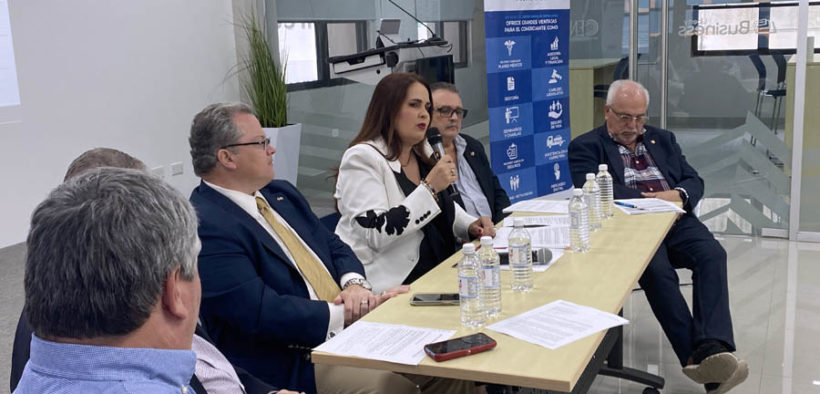Retailers Assoc. president rails against proposed electric bill hike

United Retailers Association (CUD in Spanish) President Lourdes Aponte-Rodríguez on Wednesday said she opposes the increase in the electricity bill proposed by the Financial Oversight and Management Board (FOMB) for Puerto Rico to help pay the Puerto Rico Electric Power Authority’s (Prepa) multibillion-dollar debt, calling the proposal abusive and arbitrary.
According to the proposal, the increase would start with a “hybrid charge” for small businesses of about $16.25 and higher, in addition to 1.5 cents up to 500 per kilowatt-hour (kWh) and 3 cents for the excess of 500 kWh. For businesses, the proposal starts at an $800 base charge plus 1.45 cents per kWh.
“Our small and medium businesses cannot take it anymore,” Aponte said. “The economy cannot be sustained with so many increases. We cannot cope with one more economic burden. I see the future very bleak for our small and medium-sized entrepreneurs and the people in general. We will not be able to come out of the hole. The government is there to protect, make correct decisions and streamline processes, but we cannot take it anymore.”
She also said the island’s productive sector continues to be “subsidized” by customers who already receive multiple government aids and are awarded a preferential rate, as well as municipalities, “many of which are insolvent,” and will not see an increase, “so they will not have to contribute to paying the debt.”
The retail sector representative denounced that the trade group will raise its voice so the island’s political leaders take action regarding what it considers an outrageous abuse.
“The engine that moves the economy of Puerto Rico is our small and medium entrepreneurs, and they are destroying us little by little. What economy grows without the SMEs?” she questioned.
Aponte recommended Gov. Pedro Pierluisi and lawmakers take immediate action and meet with the oversight board to seek other alternatives that do not further promote the “impoverishment of the people, who are already dying.”
She added that bankruptcy filings are reportedly increasing, with the number rising as more businesses have had to close as a result of natural disasters and the pandemic.
“Once again the Financial Oversight Board has failed in its responsibility to promote economic development programs so that one day, we can be a self-sufficient island,” Aponte concluded.
Last week, the fiscal panel announced it filed an amended proposed Plan of Adjustment to restructure the Prepa debt, including a schedule to repay the reduced debt.
In a press release, the board said the plan proposes to cut Prepa’s more than $10 billion of debt and other claims by nearly half, to approximately $5.68 billion. The plan would allow the utility to end its bankruptcy and provide the financial stability “necessary to invest in a modern, resilient, and reliable energy system essential for the Puerto Rico economy to grow.”
The reduced debt would be paid by a “hybrid charge,” consisting of a flat connection fee and a “volumetric charge” based on Prepa customers’ electricity usage that would be added to their electric bills.
“This Plan would lower the potential burden on Puerto Rico residents and businesses more than any agreement the Oversight Board or the Government had reached with creditors in the past,” Chair David Skeel said.
The estimated Prepa legacy charge for customers not currently benefiting from subsidized electricity rates would be, on average, about $19 a month. The Prepa legacy charge would exclude qualifying low-income residential customers from the connection fee and kWh charge for up to 500 kWh a month.
“Almost half of PREPA’s roughly 1.4 million residential customers would not pay any PREPA legacy charge if they consumed less than 500 kilowatt-hours of electricity per month,” Skeel said. “Customers who reduce energy consumption would be less affected.”
For non-subsidized residential customers, the proposed legacy charge would be: a flat $13 per month connection fee, 0.75 cents kWh for up to 500 kWh per month of electricity, and 3 cents per kWh for electricity over 500 kWh per month.
For commercial, industrial and government customers, the proposed legacy charge would be: a connection fee of between $16.25 for small business customers, $20 per month for smaller industrial companies and $1,800 per month for large businesses proportional to their current rate and between 0.97 cents and 3 cents per kWh per month for electricity.
The proposed legacy charge is subject to approval by the Puerto Rico Energy Bureau (PREB), the independent energy regulator, which may not implement the legacy charge the way it is described in the plan. PREPA’s rates, however, must comply with its obligations on the reduced debt, the board added.
The board took “many factors and data into consideration to determine the PREPA legacy charge, and carefully analyzed how much Puerto Rican households pay for their energy needs as a share of their income.”
The fiscal board further noted that it considered the significant risks Prepa faces from “volatile fuel costs, which make up the largest share of customers’ bills, the increased needs for future investments in PREPA’s grid and power generation, and the potential effect of customers switching to alternative sources of energy in the future.”












